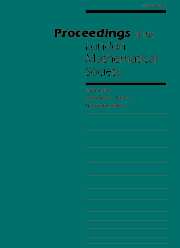Crossref Citations
This article has been cited by the following publications. This list is generated based on data provided by
Crossref.
Malnič, Aleksander
Nedela, Roman
and
Škoviera, Martin
2000.
Lifting Graph Automorphisms by Voltage Assignments.
European Journal of Combinatorics,
Vol. 21,
Issue. 7,
p.
927.
Nedela, Roman
and
Škoviera, Martin
2001.
Regular Maps on Surfaces with Large Planar Width.
European Journal of Combinatorics,
Vol. 22,
Issue. 2,
p.
243.
Feng, Yan-Quan
and
Kwak, Jin Ho
2002.
Constructing an Infinite Family of Cubic 1-Regular Graphs.
European Journal of Combinatorics,
Vol. 23,
Issue. 5,
p.
559.
2003.
Communications of the Korean Mathematical Society,
Vol. 18,
Issue. 1,
p.
1.
Kwon, Young Soo
2004.
New regular embeddings of n‐cubes Qn.
Journal of Graph Theory,
Vol. 46,
Issue. 4,
p.
297.
Li, Cai Heng
and
Širáň, Jozef
2005.
Regular maps whose groups do not act faithfully on vertices, edges, or faces.
European Journal of Combinatorics,
Vol. 26,
Issue. 3-4,
p.
521.
Wang, Yan
and
Kwak, Jin Ho
2005.
Frobenius maps.
Discrete Mathematics,
Vol. 303,
Issue. 1-3,
p.
117.
Conder, Marston
and
Wilson, Steve
2007.
Inner reflectors and non-orientable regular maps.
Discrete Mathematics,
Vol. 307,
Issue. 3-5,
p.
367.
Staneková, L'ubica
2007.
t-Balanced Cayley maps of dihedral groups.
Electronic Notes in Discrete Mathematics,
Vol. 28,
Issue. ,
p.
301.
Jones, Gareth A.
Nedela, Roman
and
Škoviera, Martin
2007.
Regular embeddings ofKn,nwherenis an odd prime power.
European Journal of Combinatorics,
Vol. 28,
Issue. 6,
p.
1863.
Du, Shao-Fei
Jones, Gareth
Kwak, Jin Ho
Nedela, Roman
and
Škoviera, Martin
2007.
Regular embeddings ofKn,nwherenis a power of 2. I: Metacyclic case.
European Journal of Combinatorics,
Vol. 28,
Issue. 6,
p.
1595.
Kwak, Jin Ho
and
Kwon, Young Soo
2008.
Classification of reflexible regular embeddings and self-Petrie dual regular embeddings of complete bipartite graphs.
Discrete Mathematics,
Vol. 308,
Issue. 11,
p.
2156.
ŠIRÁŇ, JOZEF
STANEKOVÁ, ĽUBICA
and
OLEJÁR, MARIÁN
2011.
REFLEXIBLE REGULAR MAPS WITH NO NON-TRIVIAL EXPONENTS FROM RESIDUAL FINITENESS.
Glasgow Mathematical Journal,
Vol. 53,
Issue. 3,
p.
437.
Zhang, Jun-Yang
and
Du, Shao-Fei
2012.
On the orientable regular embeddings of complete multipartite graphs.
European Journal of Combinatorics,
Vol. 33,
Issue. 6,
p.
1303.
Conder, Marston
Nedela, Roman
and
Širáň, Jozef
2012.
Classification of regular maps of Euler characteristic −3p.
Journal of Combinatorial Theory, Series B,
Vol. 102,
Issue. 4,
p.
967.
Malnič, Aleksander
Nedela, Roman
and
Škoviera, Martin
2012.
Regular maps with nilpotent automorphism groups.
European Journal of Combinatorics,
Vol. 33,
Issue. 8,
p.
1974.
Širáň, Jozef
2013.
Surveys in Combinatorics 2013.
p.
161.
Nedela, Roman
and
_koviera, Martin
2013.
Handbook of Graph Theory, Second Edition.
Vol. 20134658,
Issue. ,
p.
820.
Jones, Gareth A.
2013.
Characterisations and Galois conjugacy of generalised Paley maps.
Journal of Combinatorial Theory, Series B,
Vol. 103,
Issue. 2,
p.
209.
Du, Shaofei
and
Zhang, Jun-Yang
2014.
A classification of orientably-regular embeddings of complete multipartite graphs.
European Journal of Combinatorics,
Vol. 36,
Issue. ,
p.
437.


